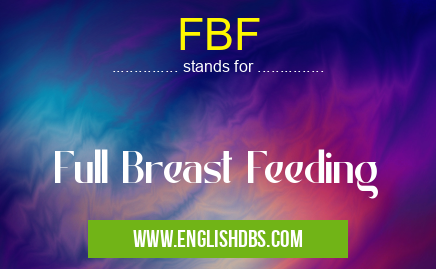What does FBF mean in UNCLASSIFIED
FBF stands for Full Breast Feeding, a practice where infants receive exclusive nutrition from breast milk for the first six months of life, with the introduction of appropriate complementary foods thereafter, while continuing breastfeeding for up to two years or beyond. This practice has numerous benefits for both the infant and the mother.

FBF meaning in Unclassified in Miscellaneous
FBF mostly used in an acronym Unclassified in Category Miscellaneous that means Full Breast Feeding
Shorthand: FBF,
Full Form: Full Breast Feeding
For more information of "Full Breast Feeding", see the section below.
Importance of FBF
Exclusive Breastfeeding for the First Six Months:
- Provides optimal nutrition for infants, meeting their nutritional needs for growth and development.
- Protects against infections and reduces the risk of diarrhea, respiratory infections, and ear infections.
- Promotes healthy digestion and reduces the risk of allergies and intolerances.
- Contributes to cognitive development and enhances language skills.
Continued Breastfeeding for Up to Two Years or Beyond:
- Provides ongoing nutritional support and immune protection.
- Reduces the risk of chronic diseases such as obesity, diabetes, and cardiovascular disease.
- Strengthens the bond between mother and child.
Benefits for Mothers
- Promotes uterine contractions after birth, reducing postpartum bleeding.
- Lowers the risk of breast and ovarian cancer.
- Reduces the risk of postpartum depression.
- Provides a convenient and economical way to feed infants.
Guidelines for FBF
- Exclusive breastfeeding for the first six months of life.
- Frequent feedings, on demand, both day and night.
- No supplementation with formula or other liquids, unless medically indicated.
- Introduction of complementary foods at around six months of age, while continuing to breastfeed.
- Breastfeeding for up to two years or beyond, as desired by the mother and child.
Essential Questions and Answers on Full Breast Feeding in "MISCELLANEOUS»UNFILED"
What is Full Breast Feeding (FBF)?
Full Breast Feeding (FBF) is the exclusive feeding of breast milk to an infant for the first six months of life, with no supplementation of formula or other foods.
Why is FBF recommended for the first six months?
The World Health Organization (WHO) recommends FBF for the first six months because breast milk provides optimal nutrition and protection for infants. It contains all the nutrients necessary for growth and development, as well as antibodies and other protective factors that help prevent infections and diseases.
What are the benefits of FBF for the infant?
FBF has numerous benefits for infants, including:
- Reduced risk of infections, such as diarrhea and respiratory infections
- Improved cognitive development
- Lower risk of obesity and other chronic diseases later in life
- Enhanced bonding between mother and infant
What are the benefits of FBF for the mother?
FBF can also be beneficial for mothers, including:
- Reduced risk of postpartum bleeding and anemia
- Increased production of oxytocin, which helps the uterus contract and promotes bonding
- Potential reduction in the risk of breast and ovarian cancer
How can I achieve FBF?
To achieve FBF, it is important to:
- Initiate breastfeeding within the first hour after birth
- Breastfeed frequently, on demand
- Avoid giving the infant formula or other supplements unless medically necessary
- Seek support from a lactation consultant or other healthcare provider if needed
Final Words: FBF is a highly recommended practice that provides numerous benefits for infants and mothers. By adhering to the guidelines for FBF, mothers can ensure the optimal health and well-being of their children while also experiencing the benefits themselves.
FBF also stands for: |
|
| All stands for FBF |
